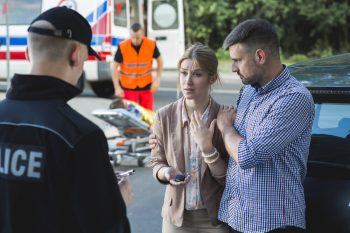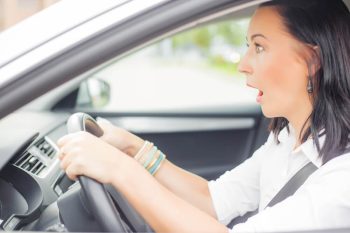How to Gather Critical Information from Witnesses After an Accident in Holmdel, Asbury Park, Red Bank, and Southern New Jersey

A Witness Can Make a Significant Difference in the Outcome of Your Claim
The worst case is an accident with two lone drivers and different versions of what occurred and who was at fault. When no witnesses exist, you may need experts to assign liability if it is not apparent from the vehicular damage and location and the drivers’ statements. In other words, an accident reconstruction expert may have to determine the speed and trajectory of each vehicle from the evidence at the accident scene to assign fault to one party or both. But accident reconstruction is costly. A witness may be the make-or-break factor for a car accident victim.
Solid Cases are Built on Evidence
After all, you need evidence to support a personal injury claim, and witnesses may be the only evidence you have to establish fault. Personal injury claims rely on physical and testimonial evidence to determine who or what caused an accident. Drivers may not remember or tell the truth, knowing that they may be punished financially for causing an accident. Physical evidence may be the damage to and location of the cars, tire marks on the road, airbag deployment, and photo or video footage by nearby stores or witnesses.
Helpful Information a Witness Can Provide
When a witness relates the story of what occurred, they can lend credibility to your factual description of the accident. They may also reveal helpful information. When a witness remarks that the corner where your accident occurred is famous for accidents, that information may help allocate fault. The city may be at fault for insufficient lighting, signals, or other reasons for the danger. The entire personal injury claim rests on finding who is to blame for the accident so that you can be compensated for your losses legally.
Who Can Be a Witness in a Personal Injury Case?
So, when you tell an insurance adjuster, police officer, or jury what occurred and the injuries resulting from the accident, a witness who corroborates your statement tips the weight of the evidence of the fault in your favor. Witnesses may be disinterested bystanders who are strangers to the parties involved, or one involved in the incident as a passenger, for example, or someone close to you who knows how the accident impacted you.
Take the Initiative and Gather Witness Contact Information
Police officers at the scene of an injury accident typically take down witness statements as part of an accident report. However, if no injuries occurred or the police never appeared, you must take the names and contact information of witnesses at the scene. When a witness is willing, you can record their name, address, email, and telephone number and then contact them quickly before an insurance adjuster speaks to them. You can get the untainted facts and prepare yourself if the witness testimony is unfavorable to you. Sometimes insurance adjusters influence witnesses while taking their statements.
But if witness testimony supports your version of the accident details, you need to do all you can to preserve their accident account. You may have no other way to get the evidence you need to prosecute your claim, and you want to tap their memory while the incident is fresh. Thus, when you write down or take a picture of witness information, you or your attorney can soon track down witnesses to obtain their statements.
What Are the Options if the Witness Doesn’t Want to Get Involved?
Hopefully, the witness you locate is responsive and helpful, willingly stating the factual account of the accident. Unfortunately, only some witnesses wish to get involved, but some are too busy to return phone calls to an attorney, among other reasons for not helping your case. Though not ideal, you may have to subpoena them for their testimony. However, you might also return to the accident scene and contact residents who live close enough to have seen what happened. And, of course, you can contact witnesses listed on the police report.

The Two Sides of Credibility and Biases of a Witness Account
Like any witness who provides evidence, they must be credible to be influential. A witness who had an obstructed view of the accident scene may not be helpful. Additionally, one who was too far from the scene may be discreditable to a jury. And while a passenger has the best vantage point of the accident before, during, and after it occurred, they may be suspected of bias if they are friends or relatives. More importantly, an injured passenger may be an adversary if they must file a claim against the driver to recover losses for their injuries. Thus, if they blame you for the accident or discredit your injury claims, you may not recover your losses or only partially recover them if you contributed to your injuries or exaggerated them.
Our Lawyers will Help Assemble and Use Witnesses’ Testimony to Prove Your Case
While you may have to gather witness information at the accident scene or soon after to preserve evidence, a personal injury attorney can help you with most of your evidence gathering. An attorney follows up with witnesses to maintain their testimony and assess the case. They also obtain police reports or hire accident reconstruction experts if necessary. And since they know that witnesses may be potential evidence for or against you, an attorney knows how to interview a witness carefully, asking questions regarding the positive or negative case implications.
If you have been injured in an accident, contact an accomplished personal injury attorney at Chamlin, Uliano & Walsh, who can help you with the crucial evidence gathering while you recuperate your health. With vast experience handling claims on behalf of injured victims in truck accidents, auto accidents, motorcycle accidents, slip and fall accidents, bus accidents, and bicycle accidents, our lawyers understand the challenging aspects of these cases and ways to overcome them. Our law firm will assist with getting maximum compensation for your injuries in Wall, Holmdel, Freehold, Red Bank, Howell, Belmar, Long Branch, and towns across Monmouth and Middlesex Counties. Contact us at 732-440-3950 or make your appointment for your free consultation online.
